18种特殊的反义疑问句
- 格式:doc
- 大小:28.50 KB
- 文档页数:3
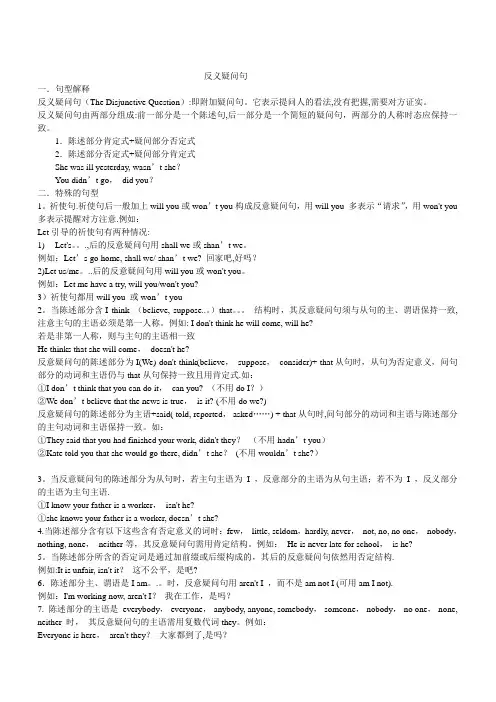
反义疑问句一.句型解释反义疑问句(The Disjunctive Question):即附加疑问句。
它表示提问人的看法,没有把握,需要对方证实。
反义疑问句由两部分组成:前一部分是一个陈述句,后一部分是一个简短的疑问句,两部分的人称时态应保持一致。
1.陈述部分肯定式+疑问部分否定式2.陈述部分否定式+疑问部分肯定式She was ill yesterday, wasn’t she?You didn’t go,did you?二.特殊的句型1。
祈使句.祈使句后一般加上will you或won’t you构成反意疑问句,用will you 多表示“请求”,用won't you 多表示提醒对方注意.例如:Let引导的祈使句有两种情况:1) Let's。
.,后的反意疑问句用shall we或shan’t we。
例如:Let’s go home, shall we/ shan’t we? 回家吧,好吗?2)Let us/me。
..后的反意疑问句用will you或won't you。
例如:Let me have a try, will you/won't you?3)祈使句都用will you 或won’t you2。
当陈述部分含I think (believe, suppose..。
)that。
结构时,其反意疑问句须与从句的主、谓语保持一致,注意主句的主语必须是第一人称。
例如: I don't think he will come, will he?若是非第一人称,则与主句的主语相一致He thinks that she will come,doesn't he?反意疑问句的陈述部分为I(We) don't think(believe,suppose,consider)+ that从句时,从句为否定意义,问句部分的动词和主语仍与that从句保持一致且用肯定式.如:①I don’t think that you can do it,can you? (不用do I?)②We don’t believe that the news is true,is it? (不用do we?)反意疑问句的陈述部分为主语+said( told, reported,asked……) + that从句时,问句部分的动词和主语与陈述部分的主句动词和主语保持一致。
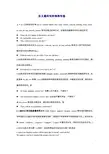
反义疑问句的特殊句型(一)(1)当陈述部分有never,seldom, hardly,few,little,barely, scarcely, nothing,none, rarely, no, not, no one, nobody, neither等否定意义的词汇时,后面的反意疑问句则为肯定形式:●There are few apples in the basket, are there?●He can hardly swim, can he?●They seldom come late, do they?(2)当陈述部分的主语为everyone, someone, anyone, no one, nobody等表示人的不定代词时,疑问部分的主语常用they:●Nobody came to see me while I was out, did they?(3)当陈述部分的主语为everything, something, anything, nothing等表示物的不定代词时,疑问部分的主语用it:●Something is wrong with your watch, isn’t it?(4)当陈述部分含有否定意思的词是unhappy, dislike, unfriendly,等含有否定词缀的派生词,也就是有un, dis-, no-前缀、less-后缀等含有词缀而意思否定的词,当做肯定句处理,疑问部分要用否定形式。
如:●He looks unhappy, doesn’t he? 他看上去不高兴,不是吗?●The girl dislikes history, doesn’t she? 这女孩不喜欢历史,不是吗?有less, fewer等词视为肯定词,疑问部分用否定形式。
如:●There will be less pollution, won't there?(二)表示主语主观意愿的词含有think, believe, suppose, imagine, expect等动词后接宾语从句构成的主从复合句在构成反意疑问句时,视情况不同有两种不同的构成方式。
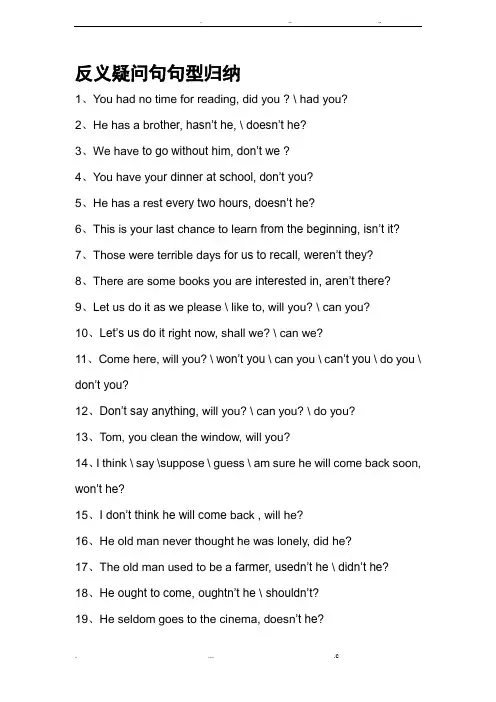
反义疑问句句型归纳1、You had no time for reading, did you ? \ had you?2、He has a bro ther, hasn’t he, \ doesn’t he?3、We have to go without him, don’t we ?4、You have you r dinner at school, don’t you?5、He has a res t every two hours, doesn’t he?6、This is your last chance to learn from the beginning, isn’t it?7、Those were terrible days f or us to recall, weren’t they?8、There are some books you ar e interested in, aren’t there?9、Let us do it as we please \ like to, will you? \ can you?10、Let’s us do it right now, shall we? \ can we?11、Come here, will you? \ won’t you \ can you \ c an’t you \ do you \ don’t you?12、Don’t say anything, will you? \ can you? \ do you?13、Tom, you clean the window, will you?14、I think \ say \suppose \ guess \ am sure he will come back soon, won’t he?15、I don’t think he will come back , will he?16、He old man never thought he was lonely, did he?17、The old man used to be a f armer, usedn’t he \ didn’t he?18、He ought to come, oughtn’t he \ shouldn’t?19、He seldom goes to the cinema, doesn’t he?( hardly, never, few, little, nothing, nobody)20、It’s unfair, isn’t it?21、One can’t be car eful enough, can one \ can he?22、Eve rything goes well, doesn’t it?23、Everybody agrees with him, doesn’t he \ don’t they?24、All we needed has been bought, hasn’t it?25、All we invited have arrived, haven’t they?(All refers to people)26、Learning E nglish is very hard, isn’t it?27、He studies hard and he is often prai sed by his teachers, isn’t he?28、We must be more polite in this occasion, needn’t we?29、He m ust be a brave man, isn’t he?30、It must have rained last night, didn’t it?31、He mush hav e known the answer, hasn’t he?32、He can’t have done such a foolish thing, has he?33、I am a student, aren’t I ?34、So he has known the secret, has he?35、Oh, you have the same type of sell phone as I, do you?一、反意疑问句的意义及其构成反意疑问句又叫附加疑问句,是指当提问的人对前面所叙述的事实不敢肯定,而需要向对方加以证实时所提出的问句。
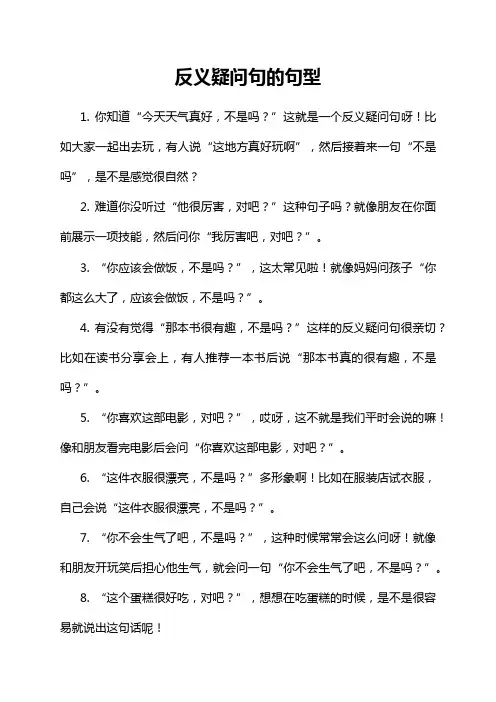
反义疑问句的句型
1. 你知道“今天天气真好,不是吗?”这就是一个反义疑问句呀!比如大家一起出去玩,有人说“这地方真好玩啊”,然后接着来一句“不是吗”,是不是感觉很自然?
2. 难道你没听过“他很厉害,对吧?”这种句子吗?就像朋友在你面前展示一项技能,然后问你“我厉害吧,对吧?”。
3. “你应该会做饭,不是吗?”,这太常见啦!就像妈妈问孩子“你都这么大了,应该会做饭,不是吗?”。
4. 有没有觉得“那本书很有趣,不是吗?”这样的反义疑问句很亲切?比如在读书分享会上,有人推荐一本书后说“那本书真的很有趣,不是吗?”。
5. “你喜欢这部电影,对吧?”,哎呀,这不就是我们平时会说的嘛!像和朋友看完电影后会问“你喜欢这部电影,对吧?”。
6. “这件衣服很漂亮,不是吗?”多形象啊!比如在服装店试衣服,自己会说“这件衣服很漂亮,不是吗?”。
7. “你不会生气了吧,不是吗?”,这种时候常常会这么问呀!就像和朋友开玩笑后担心他生气,就会问一句“你不会生气了吧,不是吗?”。
8. “这个蛋糕很好吃,对吧?”,想想在吃蛋糕的时候,是不是很容易就说出这句话呢!
9. “他肯定能做好,不是吗?”,就好像对别人充满信心时会说“他那么厉害,肯定能做好,不是吗?”。
10. “你已经准备好了,对吧?”,比如要去参加一个活动,会问伙伴“你已经准备好了,对吧?”。
我的观点结论:反义疑问句在我们的日常交流中真的太常见啦,它能让对话更自然、更亲切,也能更好地表达我们的情感和态度。
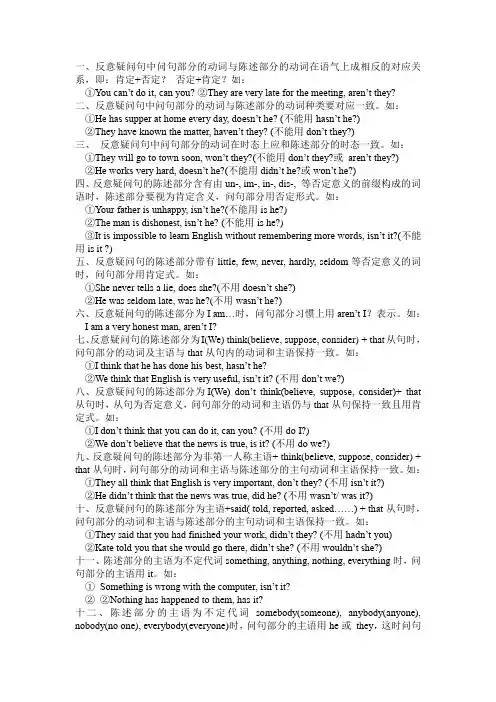
一、反意疑问句中问句部分的动词与陈述部分的动词在语气上成相反的对应关系,即:肯定+否定?否定+肯定?如:①You can’t do it, can you? ②They are very late for the meeting, aren’t they?二、反意疑问句中问句部分的动词与陈述部分的动词种类要对应一致。
如:①He has supper at home every day, doesn’t he? (不能用hasn’t he?)②They have known th e matter, haven’t they? (不能用don’t they?)三、反意疑问句中问句部分的动词在时态上应和陈述部分的时态一致。
如:①They will go to town soon, won’t they?(不能用don’t they?或aren’t they?)②He works very hard, doesn’t he?(不能用didn’t he?或won’t he?)四、反意疑问句的陈述部分含有由un-, im-, in-, dis-, 等否定意义的前缀构成的词语时,陈述部分要视为肯定含义,问句部分用否定形式。
如:①Your father is unhappy, isn’t he?(不能用is he?)②The man is dishonest, isn’t he? (不能用is he?)③It is impossible to learn English without remembering more words, isn’t it?(不能用is it ?)五、反意疑问句的陈述部分带有little, few, never, hardly, seldom等否定意义的词时,问句部分用肯定式。
如:①She never tells a lie, does she?(不用doesn’t she?)②He was seldom late, was he?(不用wasn’t he?)六、反意疑问句的陈述部分为I am…时,问句部分习惯上用aren’t I?表示。
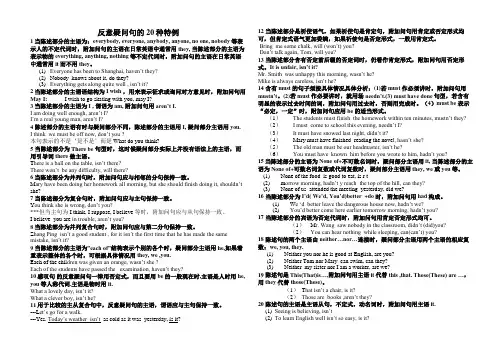
反意疑问句的20种特例1当陈述部分的主语为:everybody, everyone, anybody, anyone, no one, nobody等表示人的不定代词时,附加问句的主语在日常英语中通常用they, 当陈述部分的主语为表示物的everything, anything, nothing等不定代词时,附加问句的主语在日常英语中通常用it而不用they。
(1)Everyone has been to Shanghai, haven’t they?(2)Nobody knows about it, do they?(3)Everything gets along quite well , isn’t it?2当陈述部分的主谓语结构为I wish ,用来表示征求或询问对方意见时,附加问句用May I: I wish to go skating with you, may I?3当陈述部分的主语为I , 谓语为am, 附加问句用aren’t I.I am doing well enough, aren’t I?I’m a real young man, aren’t I?4 陈述部分的主语有时与疑问部分不同,陈述部分的主语用I, 疑问部分主语用you.I think we must be off now, don’t you ?本句表示的不是‘是不是’而是What do you think?5 当陈述部分为There be 句型时,这时候疑问部分实际上并没有语法上的主语,而用引导词there 做主语。
T here is a ball on the table, isn’t there?There won’t be any difficulty, will there?6当陈述部分为并列句时,附加问句应与相邻的分句保持一致。
M ary have been doing her homework all morning, but she should finish doing it, shouldn’t she?7 当陈述部分为复合句时,附加问句应与主句保持一致。
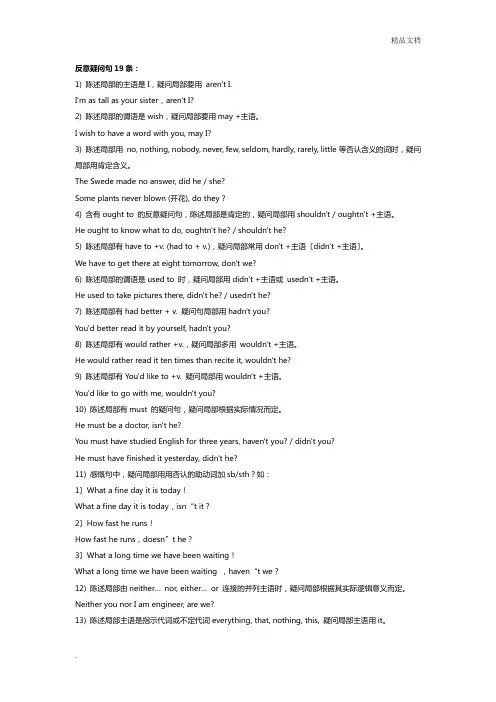
反意疑问句19条:1) 陈述局部的主语是I,疑问局部要用aren't I.I'm as tall as your sister,aren't I?2) 陈述局部的谓语是wish,疑问局部要用may +主语。
I wish to have a word with you, may I?3) 陈述局部用no, nothing, nobody, never, few, seldom, hardly, rarely, little等否认含义的词时,疑问局部用肯定含义。
The Swede made no answer, did he / she?Some plants never blown (开花), do they ?4) 含有ought to 的反意疑问句,陈述局部是肯定的,疑问局部用shouldn't / oughtn't +主语。
He ought to know what to do, oughtn't he? / shouldn't he?5) 陈述局部有have to +v. (had to + v.),疑问局部常用don't +主语〔didn't +主语〕。
We have to get there at eight tomorrow, don't we?6) 陈述局部的谓语是used to 时,疑问局部用didn't +主语或usedn't +主语。
He used to take pictures there, didn't he? / usedn't he?7) 陈述局部有had better + v. 疑问句局部用hadn't you?You'd better read it by yourself, hadn't you?8) 陈述局部有would rather +v.,疑问局部多用wouldn't +主语。
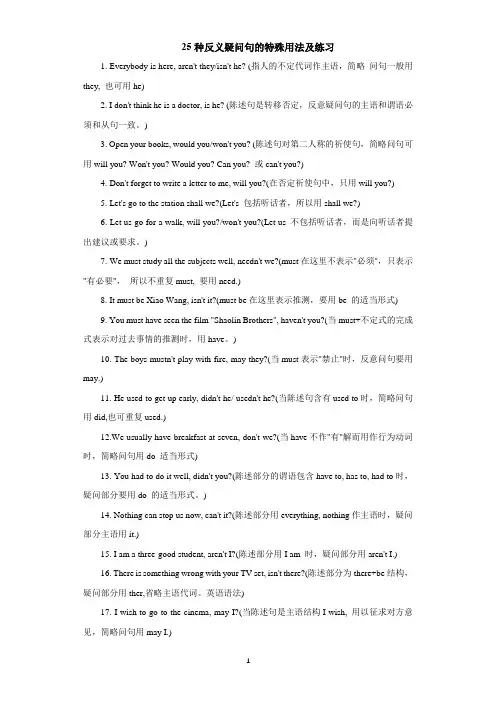
25种反义疑问句的特殊用法及练习1. Everybody is here, aren't they/isn't he? (指人的不定代词作主语,简略问句一般用they, 也可用he)2. I don't think he is a doctor, is he? (陈述句是转移否定,反意疑问句的主语和谓语必须和从句一致。
)3. Open your books, would you/won't you? (陈述句对第二人称的祈使句,简略问句可用will you? Won't you? Would you? Can you? 或can't you?)4. Don't forget to write a letter to me, will you?(在否定祈使句中,只用will you?)5. Let's go to the station shall we?(Let's 包括听话者,所以用shall we?)6. Let us go for a walk, will you?/won't you?(Let us 不包括听话者,而是向听话者提出建议或要求。
)7. We must study all the subjects well, needn't we?(must在这里不表示"必须",只表示"有必要",所以不重复must, 要用need.)8. It must be Xiao Wang, isn't it?(must be在这里表示推测,要用be 的适当形式)9. You must have seen the film "Shaolin Brothers", haven't you?(当must+不定式的完成式表示对过去事情的推测时,用have。
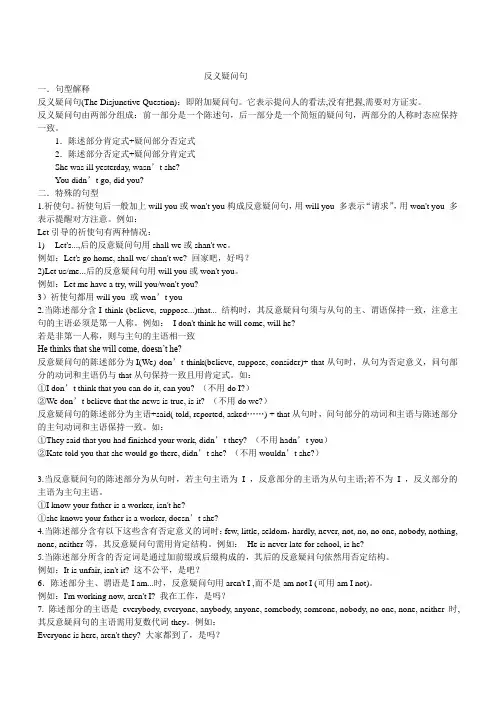
反义疑问句一.句型解释反义疑问句(The Disjunctive Question):即附加疑问句。
它表示提问人的看法,没有把握,需要对方证实。
反义疑问句由两部分组成:前一部分是一个陈述句,后一部分是一个简短的疑问句,两部分的人称时态应保持一致。
1.陈述部分肯定式+疑问部分否定式2.陈述部分否定式+疑问部分肯定式She was ill yesterday, wasn’t she?You didn’t go, did you?二.特殊的句型1.祈使句。
祈使句后一般加上will you或won't you构成反意疑问句,用will you 多表示“请求”,用won't you 多表示提醒对方注意。
例如:Let引导的祈使句有两种情况:1) Let's...,后的反意疑问句用shall we或shan't we。
例如:Let's go home, shall we/ shan't we? 回家吧,好吗?2)Let us/me...后的反意疑问句用will you或won't you。
例如:Let me have a try, will you/won't you?3)祈使句都用will you 或won’t you2.当陈述部分含I think (believe, suppose...)that... 结构时,其反意疑问句须与从句的主、谓语保持一致,注意主句的主语必须是第一人称。
例如:I don't think he will come, will he?若是非第一人称,则与主句的主语相一致He thinks that she will come, doesn’t he?反意疑问句的陈述部分为I(We) don’t think(believe, suppose, consider)+ that从句时,从句为否定意义,问句部分的动词和主语仍与that从句保持一致且用肯定式。
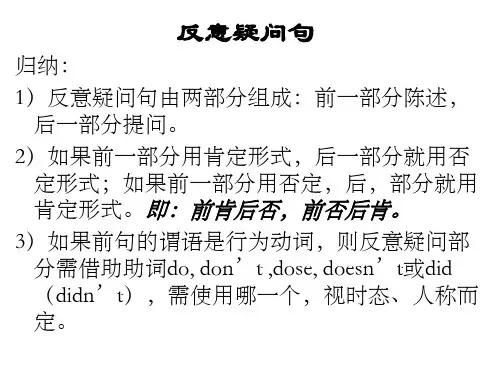
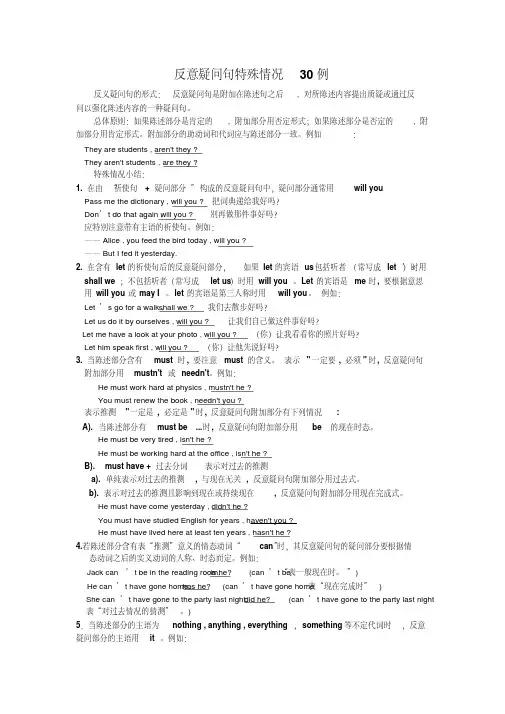
反意疑问句特殊情况30例反义疑问句的形式:反意疑问句是附加在陈述句之后, 对所陈述内容提出质疑或通过反问以强化陈述内容的一种疑问句。
总体原则:如果陈述部分是肯定的, 附加部分用否定形式;如果陈述部分是否定的, 附加部分用肯定形式。
附加部分的助动词和代词应与陈述部分一致。
例如:They are students , aren't they ?They aren't students , are they ?特殊情况小结:1. 在由“祈使句+ 疑问部分” 构成的反意疑问句中,疑问部分通常用will youPass me the dictionary , will you ? 把词典递给我好吗?Don’t do that again , will you ? 别再做那件事好吗?应特别注意带有主语的祈使句。
例如:——Alice , you feed the bird today , will you ?——But I fed it yesterday.)时用2. 在含有let的祈使句后的反意疑问部分,如果let的宾语us包括听者(常写成let’sshall we ;不包括听者(常写成let us)时用will you 。
Let的宾语是me时, 要根据意思用will you或may I 。
let的宾语是第三人称时用will you。
例如:Let’s go for a walk , shall we ? 我们去散步好吗?Let us do it by ourselves , will you ? 让我们自己做这件事好吗?Let me have a look at your photo , will you ? (你)让我看看你的照片好吗?Let him speak first , will you ? (你)让他先说好吗?3. 当陈述部分含有must 时, 要注意must 的含义。
表示"一定要, 必须"时, 反意疑问句附加部分用mustn't 或needn't。
反义疑问句(含解析、例句及详尽用法)-CAL-FENGHAI.-(YICAI)-Company One1反义疑问句一、祈使句的反义疑问句1、肯定祈使句Will you/won’t you2、否定祈使句Will you3、Let的祈使句Let us ...,will you(此处Let us 表示“允许我们...”)Let’s...,shall we (此处Let’s表示“让我们...吧”)Let + 第三人称...,will you二、Must的反义疑问句1、表示“必须” musn’t /needn’tEg. You must go now, needn’t you2、表示“不准”Eg. You musn’t smoke here, must/may you3、表示推测,肯定。
(I’m sure + 从句)Eg. You must be hungry now, aren’t youI’m sure you are hungry now, aren’t youShe must have heard about that, hasn’t sheI’m sure you have heard about that, haven’t youYou must have watched that movie last night, didn’t you(last nigh为具体时间点,所以用一般过去式)三、主语(反义疑问句)+从句主句:I(don’t)think/believe/consider/suppose 或 I’m afraid/sure...后跟从句时,可将从句部分进行反义疑问Eg. I don’t think he will win, will heI think he will win, won’t heShe thinks he will win, doesn’t she(当主句主语不是I时不适用于该用法,此句中的翻译疑问针对的是主句而非从句)四、当句中包含有表示否定意义的副词或不定代词时,反义疑问句用肯定形式Eg. Nothing happened to him, did itIt is unfair, isn’t itHe dislikes watching TV, doesn’t he(该句中含否定意义的是动词而非副词或不定代词,因此不适用于该用法,反义疑问句仍然使用否定形式)五、反义疑问句的回答反义疑问句的回答针对被提问部分的谓语动词,且与回答句前部分的Yes和No 保持一致Eg. A: You haven’t lost the ticket, have youB: D I know it’s hard to get another one at this moment.A. Yes, I haven’tB. No, I haveC. I hope soD. I’m afraid not六、陈述部分的主语与反义疑问句主语保持一致的情况1、OneEg. One can’t be too careful when driving a car, can one/he一个人在开车的时候再怎么小心也不为过。
中考英语反义疑问句的14种常考特殊用法一、反意疑问句反意疑问句是由陈述句和附在其后的附加疑问句组成。
其中附加疑问句是对陈述句所说的事实或观点提出疑问,起证实作用,一般用于证实说话者所说的事实或观点。
(表示说话者对某事有一定看法,但又不完全确定,需要对方加以证实。
)翻译为“是吗”二、反意疑问句的回答回答时,事实是肯定的用Yes;若事实是否定的则用No。
三、反意疑问句的特殊情况1.反意疑问句中问句部分的动词与陈述部分的动词在语气上成相反的对应关系,即:肯定+否定?否定+肯定?You can’t do it,can you?你不能做它,是吗?They are very late for the meeting,aren’t they?他们开会迟到了,是吗?2.附加问句的主语应与陈述句的主语保持一致,且只能用人称代词替代。
You come from Beijing,don't you?你来自北京,是不是?3.当陈述句中含有be动词,助动词,或是情态动词时,反问句部分由这些词加上主语人称代词构成:Be动词包括:am,is,are,was,were助动词有:do,does,did,have(用在完成时),has (用在完成时)等情态动词有:can,could,may,might,must,will,would,shall ,shouldHe will go home,won’t he?他要回家了,是吗?She doesn’t like to eat popcorn,does she? 她不喜欢吃爆米花,是吗?4.have的不同用法,反义疑问句用不同的动词(1)have表“有”时,反义疑问句谓语动词用have/do都行He has a new car,doesn’t/hasn’t he? (2)have表“吃,喝,玩,度过,举办”等是,反义疑问句谓语动词用doHe has supper at home every day,doesn’t he? They had a good time in Beijing,didn’t they?(3)have to表“不得不,必须”时,反义疑问句谓语动词用doKite has to help her mother,doesn’t she?(4)had better表“最好”时,反义疑问句谓语动词用hadWe had better go to school at once,hadn't we?(5)have用在完成时中,反义疑问句谓语动词用haveThey have known the matter,haven’t they? [6_副本.jpg]5.(1)反意疑问句的陈述部分带有little,few,never,hardly,seldom,nobody,nothing,no one,none,neither等否定意义的词时,问句部分用肯定式。
初中英语语法大全:反意疑问句在陈述句之后加上一个意思与之相反的简短问句,这种句子叫做反意疑问句。
反意疑问句必须由意思相反的两部分组成,在前一部分(陈述句)之后用逗号,后一部分(简短问句)之后用问号。
反意疑问句的否定句必须用缩略形成,同时它的主语必须用人称代词,不能用名词。
前一部分用降调,后一部分在表示疑问时用升调,在表示强调某意思时用降调。
反意疑问句分为两类:1.前一部分为肯定式,后一部分是否定式。
2.前一部分为否定式,后一部分是肯定式。
陈述句(肯定式),+疑问部分(否定式)?1.be动词和一般动词(实义动词)构成的反意疑问句be动词句型:现在→…,isn't(aren't)+主语?过去→…,wasn't(weren't)+主语?一般动词句型:现在→…,don't(doesn't)+主语?过去→…,didn't +主语?The pen is yours,isn't it?这笔是你的,不是吗?Lucy likes English,doesn't she?路希喜欢英语,不是吗?Yes,she does.是的,她喜欢。
No,she doesn't.不,她不喜欢。
That was a wonderful night,wasn't it?那是个奇妙的夜晚,不是吗?Yes,it was.是的,它是。
No,it wasn't.不,它不是。
Your sister helped him,didn't she?你姐姐帮助了他,不是吗?Yes,she did.是的。
她帮助他。
No,she didn't.不。
她没有帮助他。
注意反意疑问句中,前后两部分的动词在人称、数和时态上通常保持一致。
另外后一部分的人称代词应和前一部分的主语(名词或代词)保持一致。
Tom is skating,isn't he?(进行时)汤姆在滑冰,不是吗?Yes,he is.是的。
反义疑问句的14种常考特殊用法反意疑问句也叫附加疑问句。
它表示提问人的看法,没有把握,需要对方证实。
这一部分的内容在初中英语考试中也是一个常考点,特别是考查学生对疑问句的时态和回答,跟着小简老师一起来看看初中英语中反意疑问句的14种特殊用法,初中生一定要知道!”一、反意疑问句反意疑问句是由陈述句和附在其后的附加疑问句组成。
其中附加疑问句是对陈述句所说的事实或观点提出疑问,起证实作用,一般用于证实说话者所说的事实或观点。
(表示说话者对某事有一定看法,但又不完全确定,需要对方加以证实。
)翻译为“是吗”二、反意疑问句的回答回答时,事实是肯定的用Yes;若事实是否定的则用No。
三、反意疑问句的特殊情况1.反意疑问句中问句部分的动词与陈述部分的动词在语气上成相反的对应关系,即:肯定+否定?否定+肯定?You can’t do it, can you?你不能做它,是吗?They are very late for the meeting, aren’t they?他们开会迟到了,是吗?2.附加问句的主语应与陈述句的主语保持一致,且只能用人称代词替代。
You come from Beijing, don't you?你来自北京,是不是?3.当陈述句中含有be动词,助动词,或是情态动词时,反问句部分由这些词加上主语人称代词构成:Be动词包括:am, is, are, was, were助动词有:do, does, did, have(用在完成时), has(用在完成时)等情态动词有:can, could, may, might, must, will, would, shall, shouldHe will go home, won’t he?他要回家了,是吗?She doesn’t like to eat popcorn, does she?她不喜欢吃爆米花,是吗?4.have的不同用法,反义疑问句用不同的动词(1)have 表“有”时,反义疑问句谓语动词用have/do都行He has a new car, doesn’t/hasn’t he?(2)have表“吃,喝,玩,度过,举办”等是,反义疑问句谓语动词用doHe has supper at home every day, doesn’t he?They had a good time in Beijing, didn’t they?(3)have to表“不得不,必须”时,反义疑问句谓语动词用doKite has to help her mother, doesn’t she?(4)had better表“最好”时,反义疑问句谓语动词用hadWe had better go to school at once, hadn't we?(5)have用在完成时中,反义疑问句谓语动词用haveThey have known the matter, haven’t they?5.(1)反意疑问句的陈述部分带有little, few, never, hardly, seldom,nobody, nothing, no one, none, neither 等否定意义的词时,问句部分用肯定式。
英语18种特殊的反意疑问句1.祈使句。
祈使句后一般加上will you或won't you构成反意疑问句,用will you 多表示“请求”,用won't you 多表示提醒对方注意。
例如:Look at the blackboard, will you/ won't you?看黑板,好吗?Let引导的祈使句有两种情况:1)Let's...,后的反意疑问句用shall we或shan't we。
例如:Let's go home, shall we/ shan't we? 回家吧,好吗?还可以用may I来表示征求对方的同意或许可。
2)Let us/me...后的反意疑问句用will you或won't you。
例如:Let me have a try, will you/won't you? 让我试一试,行吗?2.感叹句。
感叹句后加反意疑问句时,其反意疑问句需用be的一般现在时态的否定形式。
例如:What fine weather, isn't it? 多好的天气啊,是吧?3. 当陈述部分谓语动词是need, dare, used to,且这些词被用作实义动词时,其反意疑问句需用do的适当形式。
例如:He needs help, doesn't he?他需要帮助,是吗?4.陈述部分主、谓语是I am...时,反意疑问句用aren't I 或am't I ,而不是am notI (可用am I not)。
例如:I'm working now, am't I? 我在工作,是吗?5.陈述部分的主语是everything, nothing, anything或something 时,反意疑问句的主语应用代词it。
例如:Something is wrong with my radio, isn't it? 我的收音机出毛病了,是吧?6.陈述部分的主语是everybody, everyone, anybody, anyone, somebody, someone, nobody, no one, none, neither 时, 其反意疑问句的主语需用复数代词they。
反意疑问句大全He is a league member, is n’t he? You like it , don’t you?注:对反意疑问句的回答,不管问题的提法如何,若是事实是肯定的,就用yes ;事实是否定的,就用no。
和汉语不一样,应注意。
He is n’t a driver, is he ?他不是司机,是吗?Yes, he is, 不,他是司机。
No , he isn’t 是的,他不是司机。
下面是20种特殊形式的反意疑问句。
(1)肯定的祈使句,其后面的附加疑问部分可以will you,won’t you , would you, 有时也可以 can you, can’t you,could you 等,但在否定的祈使句后一般只能用will you . 例如:Sit down and have a cup of tea, will you /won’t you?Don’t be late again, will you?(2) let’s… 后面附加问句,常用shall we? shan’t we? .有时也用OK.但以let us/me/him 开头的祈使句,其后用will you ?, won’t you.?如:Les’t have a rest , shall we? / shan’t we ?/ OK?Let us go home now , will you? / won’t you ?(3)感叹句变反意问句时,附加部分的谓语用一般现在时态to be 的否定式。
如:What a beautiful girl , isn’t she ?(4)当need ,dare 在句中作实义动词时采用do的相应形式构成。
如:He needs help , doesn’t he ?(5)陈述部分是I’m…. 句型时,附加部分一般是aren’t I 或 ain’t I . 例如I’m quite tall , aren’t I / ain’t I ?(6)当陈述部分的主语是表示“物“的不定代词everything. nothing. something. anything 时。
初中英语18种特殊的反意疑问句
1.祈使句。
祈使句后一般加上will you或won't you构成反意疑问句,用will
you 多表示“请求”,用won't you 多表示提醒对方注意。
例如:Look at the blackboard, will you/ won't you?看黑板,好吗?
Let引导的祈使句有两种情况:
1)Let's...,后的反意疑问句用shall we或shan't we。
例如:
Let's go home, shall we/ shan't we? 回家吧,好吗?
还可以用may I来表示征求对方的同意或许可。
2)Let us/me...后的反意疑问句用will you或won't you。
例如:
Let me have a try, will you/won't you? 让我试一试,行吗?
2.感叹句。
感叹句后加反意疑问句时,其反意疑问句需用be的一般现在时态的
否定形式。
例如:
What fine weather, isn't it? 多好的天气啊,是吧?
3.当陈述部分谓语动词是need, dare, used to,且这些词被用作实义动词时,
其反意疑问句需用do的适当形式。
He needs help, doesn't he?他需要帮助,是吗?
4.陈述部分主、谓语是I am...时,反意疑问句用aren't I 或ain't I ,而不
是am not I (可用am I not)。
例如:
I'm working now, ain't I? 我在工作,是吗?
5.陈述部分的主语是everything, nothing, anything或something 时,反意
疑问句的主语应用代词it。
例如:
Something is wrong with my radio, isn't it? 我的收音机出毛病了,是吧?
6.陈述部分的主语是 everybody, everyone, anybody, anyone, somebody,
someone, nobody, no one, none, neither 时, 其反意疑问句的主语需用复数代词they。
例如:
Everyone is here, aren't they? 大家都到了,是吗?
No one knows about it, do they? 没有人知道这件事,对吗?
7.陈述部分的主语是指示代词this或that时,反意疑问句的主语用it,当陈
述部分的主语是指示代词these或those时,其反意疑问句的主语用they。
例如:
This is a plane, isn't it? 这是一架飞机,是吗?
These are grapes,aren't they? 这些是葡萄,是吗?
8.陈述部分的主语是不定代词one时,反意疑问句的主语可以用one,也可用
you(美式英语用he)。
例如:
One should be ready to help others, shouldn't one? 每个人都应该乐于助人,是吧?
9.当陈述部分含有以下这些含有否定意义的词时:few, little, seldom,hardly,
never, not, no, no one, nobody, nothing, none, neither等,其反意疑问
句需用肯定结构。
例如:
He is never late for school, is he? 他上学从不迟到,是吗?
10.当陈述部分所含的否定词是通过加前缀或后缀构成的,其后的反意疑问句依
然用否定结构。
例如:
It is unfair, isn't it? 这不公平,是吧?
11.含有否定含义的词在陈述部分作动词的宾语时,其反意疑问句用肯定结构,
也可以用否定结构。
例如:
You got nothing from him, did you? 你从他那儿什么也没得到,是吗?
12.当陈述部分主语是从句、不定式(短语)、动词-ing形式时,反意疑问句的主
语应该用it。
例如:
What you need is more important, isn't it?你需要的东西更重要,是吧?
13.当陈述部分含I think (believe, suppose...)that... 结构时,其反意疑
问句须与从句的主、谓语保持一致,注意主句的主语必须是第一人称。
例如:I don't think he will come, will he? 我认为他不会来,对吗?
14.have(has)不是表示“有”的意思,并在句中做谓语时,其反意疑问句的助动
词要用do, does, did。
例如:
They had a meeting just now,didn't they? 他们刚才开了个会,是吗?
15.陈述部分有have to 时,其反意疑问句要用助动词的否定形式。
例如:
You have to water the vegetables every day, don't you?你每天都要浇菜,对吧?
16.陈述部分是there be句型时,其反意疑问句中要用there。
例如:
There was a hospital here, wasn't there? 过去这儿有家医院,是吗?
17.陈述部分有had better时,反意疑问句中要用hadn't。
例如:
We had better go to school at once, hadn't we? 我们现在最好马上去上学,好吗?
18.当陈述部分含有情态动词must时,我们便要分析一下must的含义。
如果must
作“一定;要;必须”讲,反意疑问句须用mustn't或needn't;而当must作推测意义“一定是;必定”讲时,反意疑问句则需根据must后的动词原形选用
相应的形式。
例如:
We must work hard, mustn’t we?/needn’t we? (“一定;要;必须”)
He must work hard at physics, mustn't he? 他必须努力学物理,是吧?Tom must be at home,isn't he? 汤姆一定在家,是吧?。